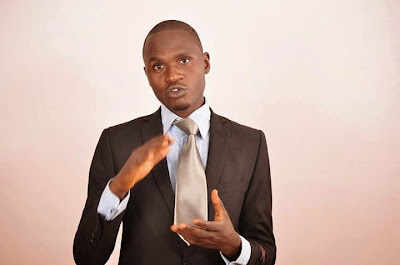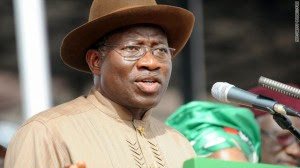War against corruption is a lost war (part 2)
Column: Agenda for Peace with Mr.Rights
Columnist: Abdulrazaq O Hamzat
We must understand the reality of today, that a war against corruption is a lost war and it has never been won by any nation. Even in China where death is the penalty for culprits, corruption still strives and flourish.‘’
Going by definition, corruption is defined as a dishonest or illegal behavior especially of people in authority. However, I see it more as the bad habit of every individual.
Coming back to Nigeria where effects of corruption are destructive beyond measure. We are not saying we cannot try to reduce corruption to some certain extent, but the present setting of Nigeria's government does not support corruption reduction, because virtually all those that should lead the battle against such menace are major culprits.
Marvin Issey, an analyst narrated a story his article titled ‘’positive corruption can lead to growth’’.
According to him, a story is told of an African governor who visited his American counterpart and was amazed at the host’s high class residence.
‘’How did you manage to construct such a high-end property with such a pittance of salary?’’ The African governor asked. The US governor smiled and invited him to his balcony and pointed to a bridge across a river near his house. “You see that bridge?” The African governor nodded in affirmative. “Five per cent”. No more was said and they sat down to proceed with their meeting. A few years later and it was the African governor playing reverse hospitability. The US governor was taken aback to learn that his African counterpart’s abode was even more splendid than his own.
“How did you manage to put up such a beautiful mansion on your equally small salary” The U.S governor asked since It was his turn to pose the question. His host held his hand and walked him to the balcony besides an Olympic sized swimming pool. He then asked him, “You see that bridge on that river?” the US governor saw the river alright, but no bridge. “No, I can’t see any bridge”, he responded. “Yes, I know.” 100 percent.
Considering the situation, it is impossible at this period to fight corruption in Nigeria with the present structure and elites. I say this because, the president whose action and inaction determine the genuineness of every government’s engagement is also a culprit. If the president is the first citizen to exhibit corrupt tendencies, how can corruption be fought in such country?
For example, President Goodluck Jonathan have been described as a very gentle man, but as gentle as he his said to be, he has demonstrated in actions and words that he is the biggest corruption asset Nigeria inherited. This was confirmed when the president refused to declare his asset upon assuming office as president.In his words, ‘’I don’t give a damn’’. He further reaffirmed this stance when he said; corruption is not the problem of Nigeria. He went ahead to pardon a convict corrupt ex-governor who is now seeking election to the senate.
From what we are seeing in the country, the president deliberately appoints corrupt officials to protect his interest. Having giving them his blessings to carry out whatever they deem proper to protect his interest, he protect them with all his presidential and security powers. When their corrupt practices are exposed, he protects them against prosecution and stand by them against all form criticism.
Let me buttress this point by citing some practical examples.
First, the former Minister of Aviation, Miss Stella Odua was accused of financial misappropriation in the aviation industry which was clear beyond any reasonable doubt, but instead of taking disciplinary action against such corrupt officer, the president shielded her for so long until he perceived that her continuous stay in office may adversely affect his re-election bid. It became clear that, if the civil society organizations didn’t sustain their protest against her continuous stay in office,she may never had been sacked.
Secondly, the Minister of Petroleum, Mrs Allison Madueke was accused of withholding about $20billion missing funds and also accused of squandering another N10billion on private jets. Instead of taking appropriate actions despite admitting the missing funds, the president simply looked the other way. By this action, the presidents message was clear, she is working for me. Whatever she does, it’s about my interest.
Thirdly, the former PDP chairman, Alhaji Bamanga Tukur was several accused of impunity, constitutional bridge and abuse of power, but since he was acting on the instruction of the president, he had freedom to do whatever he pleases with government machinery. Until his continuous stay in office proved counterproductive to the interest of the president, he was never asked to step aside despite majority opposition to his retainment. After he was asked to step aside, he was re-assigned to head the Nigerian Railway Corporation and subsequently appointed as ambassador at large.
To further confirm that president Jonathan deliberately appoints corrupt individual to serve his interest. After the removal of Bamanga Tukur as PDP chairman, the president couldn’t find a worthy candidate to install as the new PDP chairman, he preferred Alhaji Adamu Muazu, a former Bauchi state governor who was and is still being prosecuted for corruption by the Economic and Financial Crimes Commission (EFCC) for financial misappropriation of about N20billion. This is to send a clear message to all government officials and political office holders that, if you are corrupt, provided you are working in the president’s interest, you are free to do so with impunity.
With the above examples, it is clear that a false claim of fight against corruption in such a nation is like a joke only worthy in a movie.
It is worth to also add that, all those that were alleged to have stolen billions were never prosecuted after their removal from office, neither were they ever asked to refund the stolen wealth. They were simply asked to step aside and enjoy their loot. What this means is that, if you are backed by the president to steal, do so proudly, because even when you are caught, you shall be merely asked to step aside to enjoy your stolen wealth or get re-appointed to another juicy office.
If this is the situation, even the good people may be tempted to get involved in such practices. This is so because, good system is said to make evil doer dare not do evil, while bad system force the good to do evil.
Despite the clarity of these events in Nigeria, the president continues to claim he his fighting corruption and the citizens continue to wonder how. If truly the president is fighting corruption, certainly, he shall be the first culprit.
How then can Nigeria’s corruption be used for transformation?
The differences between effects of corruption in developed and developing nations is wide because, the loot of the developing nations are looted out of their economy, while those of the developed nation remain in the system,contributing to its economy from private sector. This major difference is the main reason why corruption in the developed nation didn’t affect its development as much as it does to the developing nations.
According to a report by BBC in 2006, former EFCC chairman, Mallam Nuhu Ribadu stated that, Nigerian leaders have looted over $380billion out of the country.
Mr Ribadu said he had came up with his figure of $380bn stolen or wasted since independence "easily" through records kept by the Nigerian central bank and the ministry of finance. According to another report from the same source, Nigerian leaders looted $500bn foreign aid, Former Chairman of the Economic and Financial Crimes Commission (EFCC), Nuhu Ribadu, accused past Nigerian leaders of stealing $500 billion donors’ assistance from Western countries to Nigeria since independence.
In a similar report, about $20-trillion was said to have been stolen from Nigeria's coffers by leaders who had access to the nation's money between 1960 and 2005. This was disclosed by Dapo Olorunyomi, Chief of Staff to the Chairman of the Economic and Financial Crimes Commission (EFCC) at a function in Lagos. These reports were in 2005 and 2006, I am sure the figures must have gone higher by now.
One could imagine how developed Nigeria would have become if the over $20 trillion stolen and taken outside the country were invested within the country through private sector.
Will Nigeria be desperately seeking for foreign investment if we have over $20 trillion in our economy? Will Nigeria have over 54% youth unemployment? Certainly, the answer is no. In view of this, the only answer to Nigeria’s problem is corruption re-investment.
Corruption re-investment is a situation where both past and present political officers are mandated through variety of means to re-invest their looted funds into the country’s economy. This may involve systematic appeal, security guarantee, legislative act, diplomacy and many other methods.
According to Anders Sundell, a lecturer at the University of Gothenburg while discussing effects of corruption on American recovery and reinvestment act, he noted that, U.S states which are more corrupt ended up being more efficient in stimulus spending and creating jobs.
For long, the effects of corruption on economic efficiency and growth were understudied, and several scholars argued that corruption possibly could have beneficial effects says Sundell. For example, Leff (1964) argued that corruption could stimulate economic growth by increasing competition among bureaucrats in the government bureaucracy and thereby increasing governmental efficiency. It could also work as a ‘hedge’ against bad governmental policies, by allowing entrepreneurs to implement their favored policies, aided by corrupted bureaucrats. Moreover, corruption could also reduce uncertainty, in that entrepreneurs need not fear governmental intervention as much when the bureaucracy is corrupted. Bribe could also act as ‘’speed money’’, and reduce governmental inefficiency (Mauro, 1995).
It is my view that, Nigerian government should relent on its effort to fight itself because in reality, it’s a futile effort. instead, it should work tirelessly to reduce negative effect of its actions on the people and rather concentrate on corruption re-investment which is ensuring that the already looted funds are returned back to the country and stay in the economy to contribute to job creation from the private sector. This is a gift I expect from any genuine leader in this present time before structural adjustments are made to our institutions to effectively confront corruption. Government should ensure looted funds are not allowed to be taken out of the country and certain laws such as the ‘’corruption reinvestment act’’ should be enacted in this regard by the National Assembly.
As part of the enactment, National Assembly should state categorically in the law that certain amount of money must not be kept in the bank idle for certain period of time, such funds should be channeled into businesses to create job for citizens to benefit. The law should also contain broad protection and compensation for whistle blower (media both print, electronic and social media bloggers) who expose foreign financial deposit of Nigerian public officers. The act should also contain new protection for public and private employees who blow whistle on the non-compliance by any individual. They should be protected from retaliatory action by the employer as a result of their whistle blowing. The enactment should also contain advisory appeal to encourage all previous public officials who had funds outside the country to return such funds, they should be give certain period of time to return funds into the country and start a physical business with maximum security to their investment. They should be free from violation, harassment, intimidation or questioning what so ever. After the period given had elapsed, any individual found to have hidden money outside the country through the activities of the whistle blower should be prosecuted.
My believe is that, if all looted funds are returned to Nigeria and channeled into businesses, it shall not only reduce the unemployment and government burden, but shall also increase governments revenue through tax.
For example, TY Danjuma acquired huge wealth through corrupt practices from the country. These funds if not looted by Danjuma may be looted again by another government official since corruption is a deep rooted practice in our government. After leaving public service, TY Danjuma channelled some part of these funds into his foundation, TY Danjuma Foundation giving grants to NGO’s involved in community development activities and so on. TY Danjuma may still have a lot of funds abroad underutilized and if such a law is in place, Danjuma shall be encouraged not only to bring back major parts of the funds abroad into Nigeria’s economy, but would invest it in the community for more development.
Corruption just like conflict could be positive or negative depending on how the parties involve approach it. When conflict does occur, the results may be positive or negative, depending on how those involved choose to approach it. Investigation shows that, if we approach conflict positively, it can improve the quality of decisions, stimulate involvement in the discussion, arouse creativity and imagination, create energetic climate, build more synergy and cohesion among teams, foster new ideas, alternatives and solution and test position and beliefs.
However, if conflict is approached negatively, it can be destructive and uncontrollable, create ineffective working group, cause productivity to suffer, reduce the exchange of ideas and information, develop animosities, break down communication, diminish trust and support.
Positive conflict is very useful in group deliberations. When faced with a conflict, most healthy groups will look for more information to resolve it. Even though some of the feelings generated by conflict may be negative, disagreement indicates involvement in the discussion. A good argument may be an effective antidote to apathy. Although, corruption is not like conflict, yet both can approached both from positive angles. As we can approach conflict positively, so can we for corruption to arrive at what we call ‘’positive corruption’’.
According to a Canadian analyst Erin Dixon who gave a perspective on positive corruption in Uganda, he narrated a scenario to advance his argument of positive corruption.
According to him, “In the past week and half, we have been without running water in our house and the problem was that, the landlord failed to pay the bill. We have to go extreme to deal with the lack of water. When it was rainy, we collected rain water pending the restore of our water, but surprisingly, even the rain water was cleaner than what comes from our taps he said. However, after two days without rain, their supplies have gone down.
Like any genius individual, he and others took drastic measures. They went to a fancy hotel in town for a sauna/steam room and showered. In his words, for three glorious hours, we relaxed in comfort and were able to shower away a week of built up dirt.
The hotel in question is owned by a military general (like many others that are owned by government officials). I can bet you can guess where they got the money Erin said.
He noted that, this form of corruption is what is called positive corruption. A situation where money is retained in the country and though misappropriated, the money has been used to create needed economic sustainable business. One form of corruption takes the money from a country’s economy and invests in foreign market, sort of like the African leaders that can have their asset frozen in Europe. Positive corruption has taken the money and provides employment to many individuals and indirectly the money flows back into the local community.
This is why we must understand the reality of today that a war against corruption is a lost war and it has never been won by any nation. Even in China where death is penalty of culprits, corruption still strives and flourishes.
This is why President Hu Jintao of China said; “There is no way in any country to “root out” corruption. Most critical is containing it to a level acceptable to the public. And to do this for China, the public must also understand the objective fact and reality that China has no way of entirely suppressing corruption without sending the whole country into pain and confusion.”
Follow me on twitter @Abdool101





Comments
Post a Comment